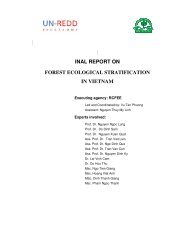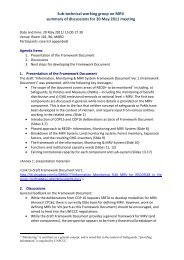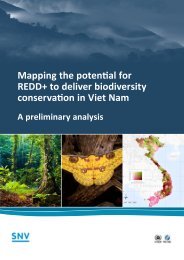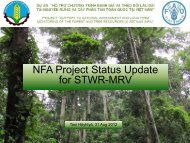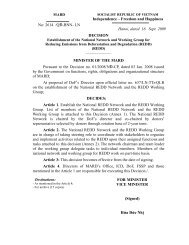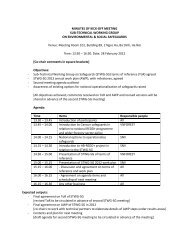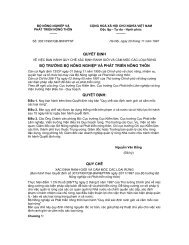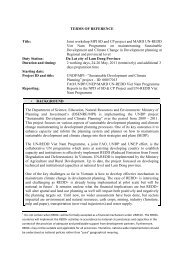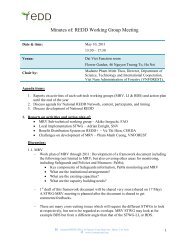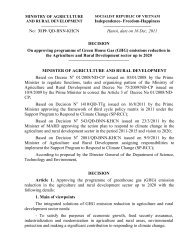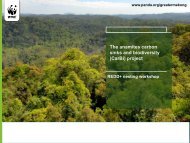FGM Workshop Background Paper - REDD - VietNam
FGM Workshop Background Paper - REDD - VietNam
FGM Workshop Background Paper - REDD - VietNam
Create successful ePaper yourself
Turn your PDF publications into a flip-book with our unique Google optimized e-Paper software.
and newly established) : more than 4 million ha.<br />
ISSUES TO BE ADDRESSED:<br />
• Rights, duties, and responsibilities of FCs for forest management as forest<br />
enterprises have not been clearly identified in legal documents, particularly,<br />
the policy on natural forest with production function allocated to FCs.<br />
According to the current law, natural forests with production function are<br />
important production materials of the company, but they are not accepted as<br />
FCs’ asset. FCs therefore manage the allocated forests as natural resources<br />
not as asset.<br />
• According to Forest Protection and Development Law, for FCs the<br />
Government executes the land and forest land allocation or forest rental with<br />
rental charge paid by FCs, but there is no specific provisions to address that.<br />
Currently, the Government has performed the land allocation without land<br />
and forest use/rental charge for many FCs. Some provinces implement forest<br />
rental, but FCs can not afford the payment for the rental charge due to lack of<br />
budget.<br />
• Decree No. 200 also does not have any provision facilitating FCs to get longterm<br />
loans for plantation cycle, essential for FCs to run their operation, even<br />
FCs operating in remote areas.<br />
• According to Forest Protection and Development Law (Article 64), though FCs<br />
have paid forest use and rental charge from their own budget (no government<br />
budget), they only are allowed to profit from the value added to the forests,<br />
but there is no transparent and clear regulation how to identify the value<br />
added and how to benefit from it.<br />
• SFEs that do not have harvestable plantation and mainly have poor natural<br />
forests were converted into FCs, do not afford to manage and protect this<br />
forest area and can generate profits.<br />
• Land withdrawn from SFEs for allocation to other bodies has not been<br />
implemented well. In some localities, numerous area of forest land has been<br />
withdrawn from FCs but failed to be allocated to other bodies. Commune<br />
People Committes therefore temporarily manage this area, but they are not<br />
forest owners and have no capacity for management and protection, which<br />
results in “ownerless” circumstances for the forest land.<br />
• Almost all FCs have not completed their forest and forest land management<br />
plans or have plans available but fail to apply as a “legal” instrument for land<br />
and forest management.<br />
• In some provinces, FCs do not have self-control right for their own financial<br />
issues during their natural forest business because in the provincial policy,<br />
profits from standing tree auction is collected by Provincial Financial<br />
Department and reallocated a part to FCs as forest management unit<br />
operating under provincial budget.<br />
• FCs had to hand over good-quality and close-to-communities lands for<br />
agricultural purposes, so they had to move to more remote region and do their<br />
business with poor-quality land left, poor infrastructure, long production cycle<br />
with lots of risks which results in higher costs, particularly transportation and<br />
lower efficiency.<br />
31




